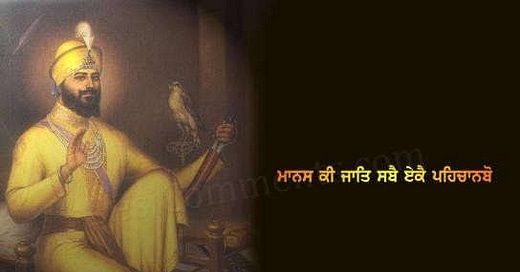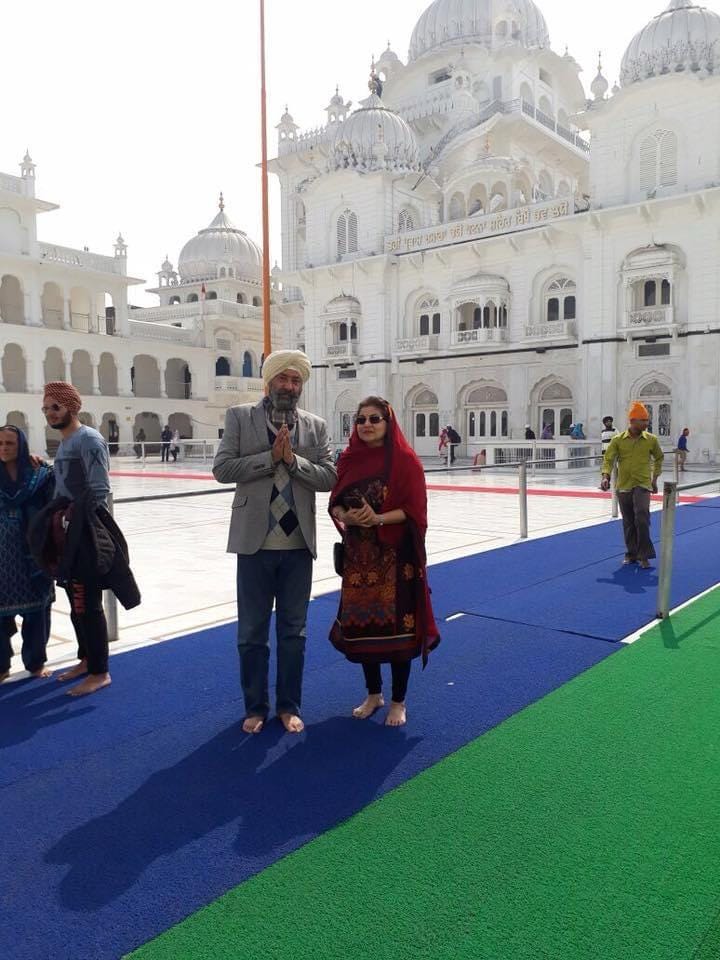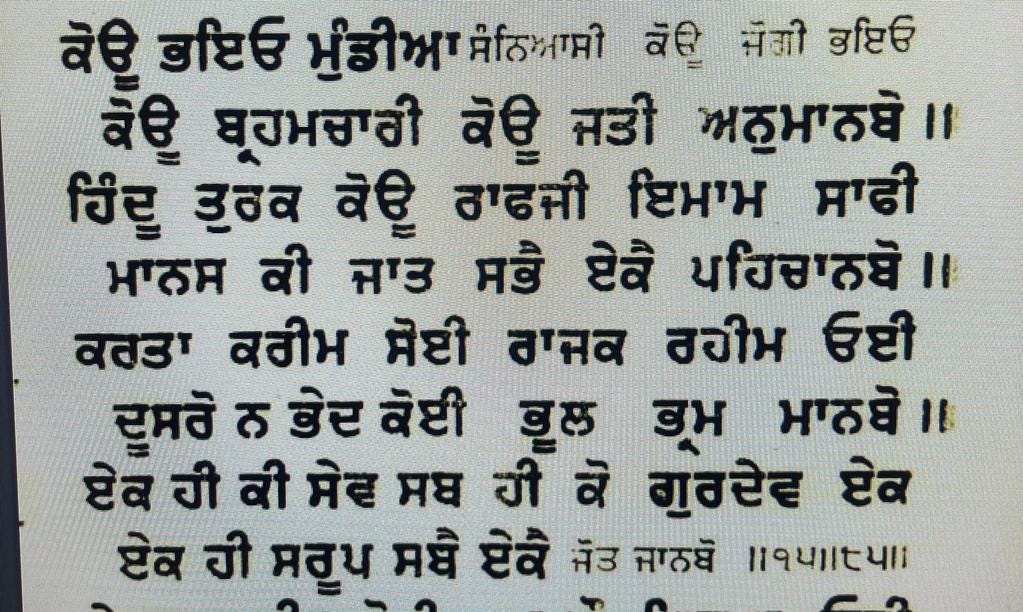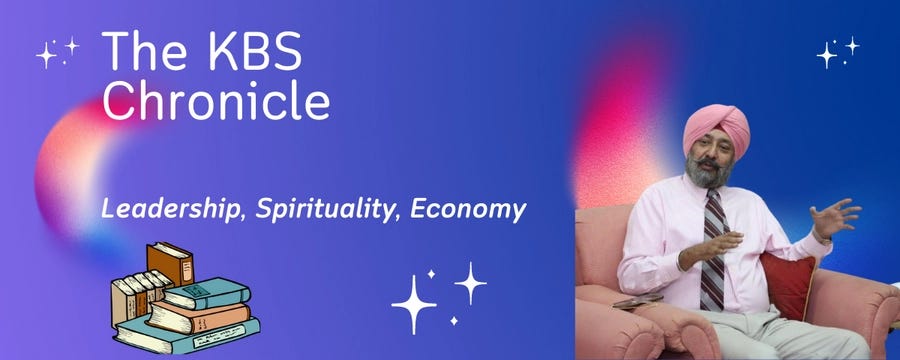Guru Gobind Singh's Clarion Call on Baisakhi: "Recognize all of mankind as one"
Celebrating 'Baisakhi as the "Birth of the Khalsa": Embracing 'ਮਾਨਸ ਕੀ ਜਾਤ ਸਬੈ ਏਕੈ ਪਹਚਾਨਬੋ' - Recognizing the Oneness of Humanity .
Celebrating Baisakhi: The Birth of the Khalsa and the Oneness of Humanity
As we celebrate Baisakhi, the sacred day that marks the birth of the Khalsa Panth founded by Dashmesh Pita, Sri Guru Gobind Singh Ji, our warmest greetings go out to all. On this day in 1699, Guru Sahib gave a clarion call to rise against tyranny, injustice, and discrimination by establishing the Khalsa—a spiritual brotherhood rooted in courage, humility, and divine purpose. Central to this revolutionary moment was his timeless teaching: “ਮਾਨਸ ਕੀ ਜਾਤ ਸਬੈ ਏਕੈ ਪਹਚਾਨਬੋ”—Recognize all of mankind as one. It was more than a call to arms; it was a call to conscience—a vision of universal human equality that remains as relevant and powerful today as it was then. The Khalsa embodies this ideal, standing as a living testament to the Guru’s vision of a just, fearless, and inclusive world.
The Khalsa Panth: A Beacon of Spiritual Resilience and Resistance
Born on December 22, 1666, in Patna Sahib (short video), to Sri Guru Tegh Bahadur Ji, the ninth Sikh Guru, and Mata Gujri Ji, Guru Gobind Singh Ji was destined to reshape the course of Sikh history. While historical narratives often spotlight his martial valour and the creation of the Khalsa, the depth and wisdom found in his divine poetry and hymns are equally profound, though less known to the wider world. The revered Sri Guru Granth Sahib, initially compiled as the Adi Granth by the fifth Sikh Guru, Sri Guru Arjan Dev Ji, encapsulates the hymns of the first five Gurus alongside the spiritual verses of various Bhagats and Saints. Tragically, some earlier renditions of these sacred scriptures were lost to the waters of the Sirsa river during Guru Gobind Singh Ji's strategic withdrawal from the Anandpur Sahib fortress en route to Chamkaur Sahib, amidst relentless pursuit by enemy forces.

Beyond the Battlefield: The Poetic Wisdom of Guru Gobind Singh Ji
In the sanctified town of Talwandi Sabo, also known as Damdama Sahib, Guru Gobind Singh Ji undertook the monumental task of recompiling the Sri Guru Granth Sahib. It was here that he enshrined the divine verses of his father, Guru Teg Bahadur Ji, as Mehl 9, enriching the eternal scripture, now worshipped by the Sikh as the embodiment of the living Guru, with his sacred wisdom. Notably, in an act of humility, he chose not to include his own compositions in the Sri Guru Granth Sahib, reserving them instead for the Dasam Granth. This separate volume, though deeply venerated, is not as universally explored among the Sikhs, or scholars and devotees at large.
Baisakhi and the Khalsa: Embracing Guru Gobind Singh Ji’s Vision of Universal Brotherhood
On this blessed day of Baisakhi, as we commemorate the creation of the Khalsa Panth by Guru Gobind Singh Ji in 1699, we are reminded of his timeless vision of unity and equality. His verses from “Akal Ustat”, part of the Dasam Granth, offer profound insight into his inclusive philosophy—one that transcends religious, social, and racial divides to affirm the universal brotherhood of humanity under one Divine Creator. Guru Gobind Singh Ji called upon humanity to rise above superficial distinctions and recognize the shared light that dwells within all. This ideal, rooted in the spiritual foundation of the Khalsa, urges us even today to build an egalitarian society based on dignity, mutual respect, and the intrinsic oneness of all people.
ਮਾਨਸ ਕੀ ਜਾਤ ਸਬੈ ਏਕੈ ਪਹਚਾਨਬੋ—Recognize all of mankind as one
ਕੋਊ ਭਇਓ ਮੁੰਡੀਆ ਸੰਨਿਆਸੀ ਕੋਊ ਜੋਗੀ ਭਇਓ
ਕੋਊ ਬ੍ਰਹਮਚਾਰੀ ਕੋਊ ਜਤੀ ਅਨਮਾਨਬੋ ॥
ਹਿੰਦੂ ਤੁਰਕ ਕੋਊ ਰਾਫਜੀ ਇਮਾਮ ਸਾਫੀ
ਮਾਨਸ ਕੀ ਜਾਤ ਸਬੈ ਏਕੈ ਪਹਚਾਨਬੋ ॥
ਕਰਤਾ ਕਰੀਮ ਸੋਈ ਰਾਜਕ ਰਹੀਮ ਓਈ
ਦੂਸਰੋ ਨ ਭੇਦ ਕੋਈ ਭੂਲ ਭ੍ਰਮ ਮਾਨਬੋ ॥
ਏਕ ਹੀ ਕੀ ਸੇਵ ਸਭਹੀ ਕੋ ਗੁਰਦੇਵ ਏਕ
ਏਕ ਹੀ ਸਰੂਪ ਸਬੈ ਏਕੈ ਜੋਤ ਜਾਨਬੋ ॥੧੫॥੮੫॥
The Hindi/ Devnagri1 version and the English transliteration2 is given in the footnotes.
English Translation
"Some have become shaven-headed renunciates, some yogis;
Some are celibates, some are ascetics without any pride (ego).
Some are Hindus, some Turks, some Rafzis (Shia), some follow Imam Shafi (Sunni);
Recognize all of mankind as one.
The Creator is the Generous One,
the Sustainer is the Merciful One Himself;
Do not recognize any other distinction;
consider such thoughts to be mistakes or illusions.
The service of the One is the teacher of all;
recognize that the One Light pervades all.
Recognize that all forms are of the One;
know that the Light within all is the same ||15||85||"

Analyzing the Interpreting these Priceless Verses
Unity in Diversity: The Vision of Guru Gobind Singh Ji
Guru Gobind Singh Ji's verses from "Akal Ustat" stand as a testament to the profound ethos of inclusivity and egalitarianism that he championed. In these lines, there is an assertion of a singular human identity that transcends the superficial divisions of caste, creed, and religious practice. The Tenth Guru articulates a vision of humanity unified under one divine light, where the external labels of 'Hindu', 'Turk', 'Rafzi', 'Imam', 'Shafi', or any other distinction of religious or social identity, are rendered insignificant in the face of a shared, inherent divinity.
The Divine Oneness: A Revolutionary Perspective
The essence of Guru Gobind Singh Ji's sermon is encapsulated in the notion that God, the Creator ('Karta'), the Generous ('Karim'), the King ('Rajak'), and the Merciful ('Rahim'), is singular and indistinguishable within His creation. The Guru dismisses any notion of duality or otherness ('Doosro na bhed'), calling such distinctions as mere illusions ('bhool bhram'). This perspective was revolutionary, advocating a society based on spiritual unity rather than divisive identities.
A Call to Universal Brotherhood
The Guru's sermon is not passive; it is an active call for recognition ('pehchaanbo') and realization ('jaanbo') that the divine light ('jot') is uniformly present in all. The Guru's words are a directive for service ('sev') to the one Creator, which he deems as the ultimate Guru ('Gurudev') for all humanity. This sermon, thus, lays the foundation for a society that is just, compassionate, and united, guided by the omnipresent luminosity of the divine.
The Spiritual Unity amid Religious Persecution
In an era where the spiritual canvas was painted with diverse expressions of faith and devotion, Guru Gobind Singh Ji’s verses emerge as a powerful exhortation to acknowledge the unity of the human spirit. These verses, composed during a time of intense persecution of non-Muslims by the bigoted Mughal Emperor Aurangzeb, serve not just as a call for unity, but as a profound acknowledgment of the divine essence inherent in every individual. They challenge us to look beyond mere tolerance, advocating for a deep-seated respect and honor for all spiritual paths as different manifestations of one singular, ultimate reality.
Humanity Beyond Dogma: The Compassion of Dashmesh Pita
Dashmesh Pita, through these timeless verses, upholds the highest human values, teaching us to distinguish the essence of a faith from the actions of its misguided proponents. Despite the brutality endured by his father, Sri Guru Teg Bahadur Ji, and the Sikhs under Aurangzeb's rule, Guru Gobind Singh Ji did not cast blame upon the followers of Islam as a whole. Instead, his writings reflect an extraordinary breadth of vision, recognizing that the deeds of a cruel ruler do not define the faith he professes. This distinction is crucial, marking Guru Gobind Singh Ji's wisdom as not only spiritual guidance but also a lesson in humanity and forgiveness. The verses of "Akal Ustat" thus resonate with the spirit of compassion and understanding, characteristics that defined the life and legacy of the Ten Sikh Gurus.
Guru Gobind Singh Ji: Leading Socio-Spiritual Reform
In the our humble quest to analyze these verses, one cannot but reach the conclusion that Guru Gobind Singh Ji's vision for humanity was not confined to spiritual upliftment alone; it was also a socio-political ideology that challenged the status quo. By advocating for a singular divine essence within all, the Saint-Soldier undermined the hierarchical structures that had long perpetuated inequality and division. This sermon, therefore, is not only a spiritual guide but also a charter for human rights and dignity, a call for social reform that continues to resonate with universal relevance.
Timeless Teachings: A Beacon for Unity and Compassion
As we joyously celebrate Baisakhi—the historic day on which Guru Gobind Singh Ji founded the Khalsa Panth—we are reminded of his timeless teachings that continue to illuminate the path toward a more just, compassionate, and unified world. This occasion is not only one of festivity but also of deep reflection, as we reaffirm our commitment to the values of Chardi Kala (eternal optimism) and Sarbat Da Bhala (welfare of all).
Guru Gobind Singh Ji’s verses, rich with spiritual wisdom and universal truths, echo the ideals of equality, justice, and empathy—values that transcend all boundaries and remain profoundly relevant in today’s world. His vision of a society anchored in moral courage and collective wellbeing urges us to look beyond divisions and embrace a higher, inclusive purpose.
In times marked by global challenges, his message offers enduring hope and direction. Let Baisakhi be a moment of celebration, introspection, and renewal—a call to embody the Khalsa spirit in our actions, and to contribute to a more compassionate, fearless, and equitable world. In living these values, we truly honour the legacy of Guru Gobind Singh Ji and the sacred foundation of the Khalsa.
कोऊ भइओ मुंडिया संन्यासी कोऊ जोगी भइओ कोऊ ब्रह्मचारी कोऊ जति अनमानबो ॥ हिन्दू तुर्क कोऊ राफजी इमाम साफी मानस की जात सभै एकै पहचानबो ॥ करता करीम सोई राजक रहीम ओही दूसरो न भेद कोई भूल भ्रम मानबो ॥ एक ही की सेव सभही को गुरुदेव एक एक ही सरूप सभै एकै जोत जानबो ॥१५॥८५॥
Ko-oo bhaio mundia sanyasi ko-oo jogi bhaio Ko-oo brahmchari ko-oo jati anmaanbo || Hindu Turk ko-oo raafzi imam saafi Maanas ki jaat sabhai eke pehchaanbo || Karta karim soi raajak raheem ohi Doosro na bhed koi bhool bhram maanbo || Ek hi ki sev sabhai ko gurudev ek Ek hi saroop sabai eke jot jaanbo ||15||85||









ਦੇਹਰਾ ਮਸੀਤ ਸੋਈ ਪੂਜਾ ਔ ਨਿਵਾਜ ਓਈ ਮਾਨਸ ਸਭੈ ਏਕ ਪੈ ਅਨੇਕ ਕੋ ਭ੍ਰਮਾਉ ਹੈ ॥
ਦੇਵਤਾ ਅਦੇਵ ਜਛ ਗੰਧ੍ਰਬ ਤੁਰਕ ਹਿੰਦੂ
ਨਿਆਰੇ ਨਿਆਰੇ ਦੇਸਨ ਕੇ ਭੇਸ ਕੋ ਪ੍ਰਭਾਉ ਹੈ ॥
ਏਕੈ ਨੈਨ ਏਕੈ ਕਾਨ ਏਕੈ ਦੇਹ ਏਕੈ ਬਾਨ ਖਾਕ ਬਾਦ ਆਤਸ ਔ ਆਬ ਕੋ ਰਲਾਉ ਹੈ ॥
ਅਲਹ ਅਤੇਖ ਸੋਈ ਪੁਰਾਨ ਔ ਕੁਰਾਨ ਓਈ ਏਕ ਹੀ ਸਰੂਪ ਸਭੈ ਏਕ ਹੀ ਬਨਾਉ ਹੈ ॥
ਵਾਹਿਗੁਰੂ ਜੀ ਕਾ ਖਾਲਸਾ ਵਾਹਿਗੁਰੂ ਜੀ ਕੀ ਫਤਿਹ
ਦਸਮੇਸ਼ ਪਿਤਾ ਜੀ ਵੱਲੋਂ ਵੈਸਾਖੀ ਵਾਲੇ ਦਿਨ ਮਾਨਵਤਾ ਦੇ ਇਤਿਹਾਸ ਵਿੱਚ ਕੀਤੇ ਵਿਲੱਖਣ ਕਾਰਜ ਨੂੰ ਆਪ ਜੀ ਨੇ ਬਾਖੂਬੀ ਵਰਨਣ ਕੀਤਾ ਹੈ। ਲੋਕ ਹਮੇਸ਼ਾਂ ਕਰਾਮਾਤ ਵੇਖਣ ਦੀਆਂ ਗੱਲਾਂ ਕਰਦੇ ਰਨ। ਮੈਂ ਆਪਣੇ ਗੁਰੂ ਸਾਹਿਬ ਜੀ ਦੇ ਚਰਨਾਂ ਵਿੱਚ ਨਮਨ ਕਰਦਾ ਹਾਂ ਜਿਹਨਾਂ ਨੇ ਦੁਨੀਆਂ ਦੀ ਅੱਜ ਤੱਕ ਦੀ ਸਭ ਤੋਂ ਵੱਡੀ ਕਰਾਮਾਤ ਅਤੇ ਕ੍ਰਾਂਤੀ ਕਰ ਕੇ ਮਾਨਵਤਾ ਦਾ ਸਦੀਵੀ ਭਲਾ ਕਰ ਦਿੱਤਾ।
ਆਪਣੀ ਅੰਮ੍ਰਿਤ ਦ੍ਰਿਸ਼ਟ ਰਾਹੀਂ ਪਾਣੀ ਵਿੱਚ ਬਾਣੀ ਮਿਲਾ ਕੇ ਮਜ਼ਲੂਮਾਂ ਨੂੰ ਜ਼ਾਲਮਾਂ ਨਾਲ ਟਾਕਰਾ ਕਰਨ ਦੇ ਯੋਗ ਹੀ ਨਹੀਂ ਬਲਕਿ ਜ਼ਾਲਮਾਂ ਦਾ ਸਰਵਨਾਸ਼ ਕਰਨ ਦੇ ਸਮਰੱਥ ਕਰ ਦਿੱਤਾ। ਕੱਲ ਦੇ ਮਜ਼ਲੂਮਾਂ ਨੂੰ ਅੱਜ ਆਪਣੀ ਰੱਖਿਆ ਦੇ ਨਾਲ ਨਾਲ ਨਿਮਾਣਿਆਂ , ਨਿਤਾਣਿਆਂ ਅਤੇ ਲਿਤਾੜੇ ਜਾਣ ਵਾਲਿਆਂ ਲਈ ਸੁਰੱਖਿਆ ਦੀ ਗਾਰੰਟੀ ਦੇ ਵਜੋਂ ਵਿੱਚ ਖਾਲਸਾ ਰੂਪ ਵਿੱਚ ਸਦੀਵੀ ਕਾਲ ਲਈ ਸਥਾਪਤ ਕਰ ਦਿੱਤਾ। ਇਸ ਤੋਂ ਵੱਡੀ ਕ੍ਰਾਂਤੀ ਅਤੇ ਕਰਮਾਤ ਹੋਰ ਕੋਈ ਨਹੀਂ ਹੋ ਸਕਦੀ। ਅੰਮ੍ਰਿਤ ਦੇ ਦਾਤੇ ਨੇ ਖਾਲਸੇ ਨੂੰ ਆਤਮਿਕ ਤੌਰ ਤੇ ਬਲਵਾਨ ਕਰਨ ਦੇ ਨਾਲ ਨਾਲ ਆਪਣਾ ਬਾਹਰੀ ਰੂਪ ਪ੍ਰਦਾਨ ਕਰਕੇ ਖਾਲਸੇ ਨੂੰ ਆਪਣੇ ਵਿੱਚ ਅਤੇ ਆਪਣੇ ਆਪ ਨੂੰ ਖ਼ਾਲਸੇ ਵਿੱਚ ਸਦਾ ਲਈ ਅਭੇਦ ਕਰ ਦਿੱਤਾ।
ਸਾਨੂੰ ਮਾਣ ਹੈ ਆਪਣੇ ਲੋਕ ਅਤੇ ਪ੍ਰਲੋਕ ਦੇ ਰਾਖੇ,,ਨੀਲੇ ਘੋੜੇ ਦੇ ਸ਼ਾਹ ਅਸਵਾਰ ਧੰਨ ਗੁਰੂ ਗੋਬਿੰਦ ਸਿੰਘ ਸਾਹਿਬ ਜੀ ਉਪਰ।
ਵਾਹਿਗੁਰੂ ਜੀ ਕਾ ਖਾਲਸਾ ਵਾਹਿਗੁਰੂ ਜੀ ਕੀ ਫਤਿਹ
ਨਿਸ਼ਾਨ ਸਿੰਘ ਕਾਹਲੋਂ